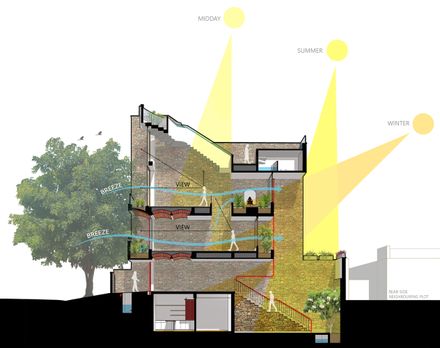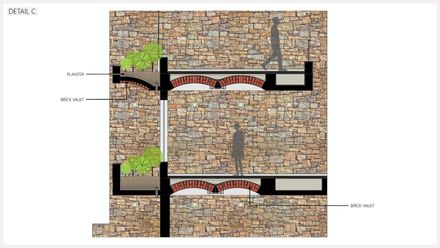People Tree House
YEAR
2022
LOCATION
Noida, India
CATEGORY
Houses
NOIDA is a planned satellite city of Delhi, and part of the National Capital region of India.
The city is organized as a series of rectilinear tree-lined transportation grids: encompassing sectors, that are further divided into blocks of plots.
The ‘People tree house’ is a 7000 sqft building, built on one such plot, and is surrounded by neighboring buildings on three sides.
The clients: medical entrepreneurs and their children, lovingly chose and named the plot ‘Ashvattha’ based on the fortuitously located ‘fig tree’ to the eastern corner of the site.
FICUS TREES:
like Banyans, Pilkhan, and Peepal, bear inward-growing fig flowers that are pollinated by their own specific species of ‘fig-wasps’ which in turn can only breed inside their partner's fig fruit.
This exhibition of mutualism results in the ripened fruit being a year-round source of nourishment for frugivorous and insectivorous birds and mammals.
The project is an attempt to lure these visiting birds, and insects to explore: carefully selected and located flora on our site, resulting in a sustainable harmonious relationship between human and non-human residents and visitors.
Reminiscent of the subcontinent's rich architectural heritage, light is let in from the south-east quadrant through apertures, skylights, and cut-outs: broken into shadow, filtered, and reflected off surfaces to bathe the volumes in ‘sufficient light’.
The building generates energy, recycles, and irrigates to nurture life, in tradition with age-old water harvesting techniques,
The curved roof and sloped skylight, channel rainwater to a storage tank at the pool level where it is released to the lower-level planters via a drip-irrigation system.
The reinforced brick concrete balcony extensions are finished with WPC (Wood Plastic Composite) floors and double up as reservoirs for rainwater and waste water runoff: a by-product of domestic water purification systems located at the highest level.
Pool water and excess irrigation water overflow, from the upper levels, are then channeled via pipes to the underground rainwater storage tank.
At the entrance level, this pipe doubles up as the handrail for the staircase that leads to sunlit subterranean work areas.
Whenever needed, the stored water is rechannelled to upper levels, creating an efficient closed loop of: ‘collect-irrigate-store-re-use’.





























